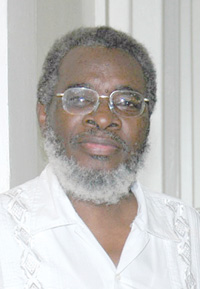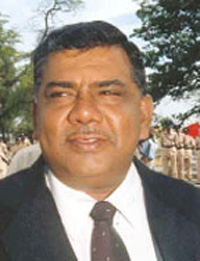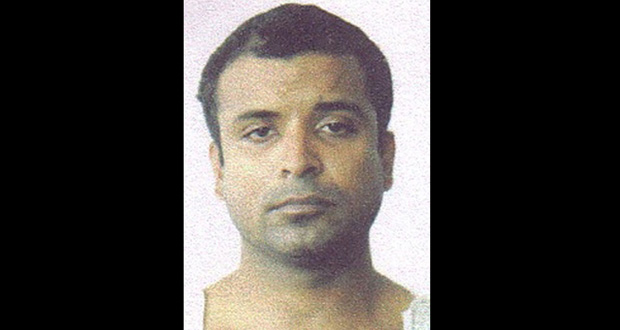Wikileaks cable… U.S. said: Khan could bring down PPP
–saw links among him, Luncheon, Gajraj
CONVICTED narco-trafficker Shaheed Roger Khan can potentially cause great embarrassment to, or even bring down, the People’s Progressive Party, whether in or out of office, by revealing his links with them and the skeletons in their closet.

This is according to a leaked cable from the United States Embassy here, dated June 29, 2006, some 14 or so days after Khan was captured in neighbouring Suriname while fleeing local lawmen.
The U.S. Embassy was quoted in the June 29, 2006 cable as saying that Khan not only enjoyed political protection from high-ranking PPP government officials, but that at a minimum, former Home Affairs Minister Ronald Gajraj and long-time Head of the Presidential Secretariat Dr Roger Luncheon collaborated with him.

The embassy also said that Gajraj, who was initially forced out of office but later posted to head the Guyana Mission in India, “Allegedly orchestrated Guyana’s “death squads” in 2002-03 — certainly in close collaboration with Khan.”
The embassy further alleged in the cable that Luncheon, then Head of the Presidential Secretariat, “is known to have intervened, and ordered the authorities to release Khan, and return his equipment when they were seized by the Guyana Defence Force years earlier on the East Coast of Demerara.
The cable also made mention of the fact that eyewitnesses had allegedly seen Khan leaving former President Bharrat Jagdeo’s office.
U.S. OFFER
Back in October, the Guyana Government had said it would take the United States up on its offer to access the testimonies given by Khan, in order to open local investigations into the “Phantom Squad,” which the self-confessed PPP government-backed crimefighter had led.
President David Granger, back in August of this year, had given his administration’s clearest signal that he fully intends to investigate the Bharrat Jagdeo-era killings. It’s a signal that the U.S. received loud and clear, as new U.S. Ambassador to Guyana, Perry Holloway was quoted as saying recently that Washington would facilitate handing over testimony given by Khan during his trial.
Holloway had told reporters that there are certain agreements that exist through the UN, the OAS, “and quite possibly Guyana, (which) do allow that in certain cases, if the rules and regulations of the agreement are done with Guyana, or we have signed up under the UN or OAS to allow for such a thing, we would be sure to be disposed to cooperating within the framework of the rule of law.”
He said that a lot of times, the requirements for such requests are pretty high, for what you have to be able to provide, to be able to go further.
“We don’t allow fishing expeditions,” Holloway said. “We actually need something sort of concrete, and (that) we could see on paper and touch. But within the agreements that we have (and we have done multilateral or international forums), we cooperate with any country in the world.”
DISTANCE SELF
Meanwhile, the cable also noted that ever since Khan’s May 2006 indictment in the U.S. on drug charges, the PPP had tried assiduously to distance itself from him. “Khan was the brashest of Guyana’s narco-criminals, but he was by no means the only one. Others will certainly try to fill the void left by Khan’s departure from the local scene. Two leading candidates are Bramhanand
(Brammanand) Nandalall and Clayton Hutson,” the U.S. Embassy said, adding:
“Older than the upstart Khan, they have been active in drug trafficking for many years. Nandalall is the “godfather” of organised crime in Guyana; Khan and Hutson both worked for him before setting up their own criminal organisations.”
Additionally, according to the cable, former U.S. Ambassador here, Ronald Bullen had met with then Home Affairs Minister Gail Teixeira on June 23, 2006 to discuss Khan and other matters.
It so transpired, again according to the cable, that she was only too willing (“eager” is the word that was used) to share her views on the risk and instability that Khan’s capture caused in Guyana. The exact words used in the cable were: “She guesses Hutson might become the next ‘kingpin.’ She said that Nandalall is keeping very quiet, and is rumoured to be cooperating with the U.S.”
The U.S. cable said, too, that Teixeira had warned that Khan’s departure from the scene opens the door for the criminal situation to become more political, in that “it will no longer be about just narcotics, but about ethnicity as well. She fears that if Hutson uses this opportunity to assume a larger role, then he and his accomplices will pose a serious political threat, with the help of drug and gun trafficking.”
Bullen, in his comments to Washington, said that the then PPP government was comfortable with Khan, because they felt he was on their side. “The possibility of a new ‘kingpin’ allied with the political opposition makes them very nervous indeed.”
According to Bullen, other sources had indicated that Nandalall was more likely than Hutson to take over as Guyana’s Number One narco-criminal.
Guyana Chronicle.

